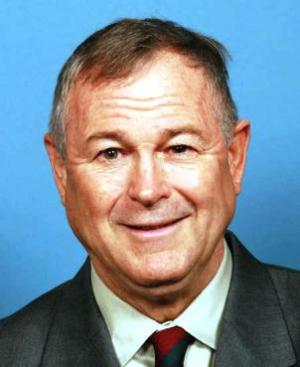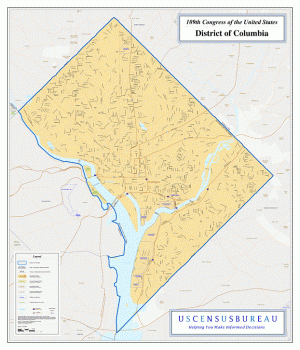The White House has spoken about directly about House Republican efforts to block the District of Columbia from implementing its new decriminalization law. It doesn't approve, and it cites states' rights and home rule. It joins a slew of DC residents and officials telling Congress to bugger off.
Marijuana policy researcher and analyst Beau Kilmer talks to the Chronicle about marijuana legalization, taxation, public health, and related issues. Plenty to chew on here.
For the first time ever we are offering an "E-Book" as our latest membership premium, as well as a popular author-signed book for a reduced price.
In an historic vote Wednesday, the US House has approved an amendment to the Treasury Department appropriations bill barring the agency from spending any money to punish financial institutions that provide services to marijuana businesses where it is legal.
A CBD cannabis oil bill becomes law in Missouri, the District of Columbia expands its medical marijuana program, Michigan prepares to improve its program, Berkeley will provide free medical marijuana for the poor and homeless, an LA medical marijuana farmers' market gets an injunction slapped on it, and more.
More cops with pill problems, more jail guards looking to earn a little easy money. Just another week in the corrupt cop front of the drug war.
Forget Amazon's promised drone deliveries; the Mexican cartels have beat them to it. Also, Massachusetts cops will need to do more than just smell weed to search you or your vehicle, Arizona PTSD patients are okayed to use medical marijuana, Uruguay delays the roll-out of its legal marijuana sales, and more.
A St. Paul drug raid is raising questions about police tactics, the hemp industry wants to clarify something, Tennessee gets its first bust under a law criminalizing drug-using pregnant women (and its first threat of a legal challenge), Pennsylvania issues opiate prescribing guidelines, and more.
Happy Bastille Day! And speaking of which, the US Sentencing Commission is reporting heavy public response to its proposal to make some sentencing reforms retroactive. Meanwhile, marijuana remains on the move, the good burghers of New York will pay for another drug war killing, millennials loosen up on drugs, and more.
The Obama administration comes out against congressional interference with the District of Columbia's decriminalization law, Dana Rohrabacher comes out as the first Republican congressman to support marijuana legalization, the Smarter Sentencing Act picks up more sponsors, and more.
The House okays marijuana banking, DC decriminalizes tomorrow, DC expands its medical marijuana program, Miami-Dade taxpayers pay for a particularly heinous killer drug raid, a lot of states did sentencing reforms last year, and more.
The city of Washington, DC, is a marijuana policy hothouse these days. It's expanding its medical marijuana program, it has a new decriminalization bill set to go into effect Thursday with House Republicans trying to stop it, it has a marijuana possession and cultivation legalization initiative poised to make the November ballot, and it has legislation that would allow for the taxation and regulation of marijuana commerce already pending before the city council. Now, the White House is weighing in too.
The "Marijuana Possession Decriminalization Amendment Act of 2014," adopted by the council in April, replaces criminal penalties for possession of small amounts of marijuana with a $25 civil fine for possession as well as forfeiture of the marijuana and any paraphernalia used to consume or carry it.
DC's decriminalization effort has clearly caught the attention of House Republicans -- one of whom, Rep. Andy Harris (R-MD), introduced an amendment to the DC appropriations bill to block its implementation. That amendment has already won a House committee vote.
Late last month, the House Appropriations Committee adopted Harris's amendment. If included in the 2015 federal budget, the rider would block the District from carrying out any law, rule or regulation to legalize or otherwise reduce criminal penalties for marijuana.
That has sparked irate reactions from both DC elected officials and advocates alike.
"These Members violated their own principles of limited government by using the power of the federal government to dictate to a local government how it can use its own local funds," DC Delegate Eleanor Holmes Norton said in a statement after the vote. "They apparently could not keep their own states from decriminalizing marijuana, so they have turned to a district where they are not accountable to the citizens to do what they couldn't convince their own states to do. Their constituents may be surprised to learn that their Members are spending their time interfering with the local laws of another district instead of devoting their time to issues affecting their districts and the nation."
"That Congressman Andy Harris would try to kill DC's efforts to stop arresting people for marijuana possession is beyond disturbing," said Dr. Malik Burnett, DC policy manager for the Drug Policy Alliance (DPA). "This amendment is an affront to the District's right to home rule, while ensuring that thousands of District residents continue to be arrested and suffer the collateral consequences associated with a criminal record. Congress should be following DC's example and end racist marijuana arrest policies, instead of defying the will of the people and reversing their decision."

DC Delegate Eleanor Holmes Norton sticks up for her constitutents. (house.gov)
District residents have begun organizing a
boycott of Ocean City, MD, part of Rep. Harris's congressional district, as a show of their disapproval his intervention in District affairs. That was an idea that came from none other than Washington, DC, Mayor Vincent Gray.
"It's become a sad tradition that members of Congress with no ties to the District use their outdated, undemocratic and unjust authority over the District's budget to further their own political and personal agenda," Gray said in a pre-4th of July statement.
Councilmember and mayoral candidate David Catania even stormed Harris's DC office after the vote demanding to discuss his efforts to block the District from implementing decrim. Harris wasn't there.
"I'm here to address what has become a congressional pastime, which is interfering in the local affairs of the District of Columbia," Catania said at the time.
And now, the effort to block the District from implementing decrim -- or any other marijuana reforms -- has caught the attention of the White House, which yesterday slammed it in no uncertain terms.
"[T]he Administration strongly opposes the language in the bill preventing the District from using its own local funds to carry out locally-passed marijuana policies, which again undermines the principles of States' rights and of District home rule," the White House said in a statement of administration policy on the Financial Services and General Government Administration Act of 2015, which contains appropriations for DC. "Furthermore, the language poses legal challenges to the Metropolitan Police Department's enforcement of all marijuana laws currently in force in the District."
(The statement of administration policy also criticized Congress for including a ban on the funding of needle exchanges in the District, as well as language restricting the District's ability to provide abortion services.)
"It is great to see the White House accepting that a majority of Americans want marijuana law reform and defending the right of DC and states to set their own marijuana policy," said Bill Piper, DPA director of national affairs. "The tide has clearly shifted against the failed war on drugs and it's only a matter of time before federal law is changed."
The White House wasn't the only group trying to send a signal to Congress yesterday. The DC city council passed a pair of emergency resolutions opposing Rep. Harris's effort to use congressional oversight to block the District from spending any of its locally-raised revenues to enact marijuana reform.
Harris's amendment would, if passed by the Congress, also block the District from enacting the results of the looming marijuana possession and cultivation legalization initiative, which is all but certain to make the November ballot after organizers handed in more than double the number of signatures needed to qualify. And it would block the District from implementing the putative legislative follow-up to the initiative, which would allow for taxed and regulated marijuana commerce in the District.
But that amendment still has not passed the House, let alone the Senate, and now, the Obama administration has made clear that it does not approve of it, either. That puts the administration on the side of the District, its voters (who consistently approve of marijuana legalization in polls), and its elected officials. House and Senate Republicans would be up against a city united against their interference in the District's domestic affairs, backed by a president who agrees with the District. While the Republicans are always eager to pick a fight with the president, this could be one fight they think twice about.
back to top
Beau Kilmer is a senior policy researcher at the RAND Corporation, where he codirects the RAND Drug Policy Research Center. His research lies at the intersection of public health and public safety, with a special emphasis on substance use, illicit markets, crime, and public policy. Some of his current projects include estimating the size of illegal drug markets, assessing the consequences of alternative marijuana policies, measuring the effect of South Dakota's 24/7 Sobriety Program on drunk driving and domestic violence outcomes, and evaluating other innovative programs intended to reduce violence. Kilmer's research has appeared in leading journals such as Addiction, American Journal of Public Health, Journal of Quantitative Criminology, Proceedings of the National Academy of Sciences, and his essays have been published by the BBC, CNN, Los Angeles Times, New York Times, Wall Street Journal, and USA Today. His book on marijuana legalization, "Marijuana Legalization: What Everyone Needs to Know" (co-authored with Jonathan Caulkins, Angela Hawken, and Mark Kleiman) was published by Oxford University Press in 2012. Before earning his doctorate at Harvard University, Kilmer received a Judicial Administration Fellowship that supported his work with the San Francisco Drug Court.

Beau Kilmer (rand.org)
The Chronicle interview took place by phone Wednesday morning.
Drug War Chronicle: What are we learning from marijuana legalization so far in Colorado and Washington, especially about prices, tax rates, and regulatory structures?
Beau Kilmer: With respect to prices, I think it's too soon to make a serious judgment. I would expect them to fall eventually as the number of producers increases and there is more competition. Regarding taxes, there is clearly tax revenue coming in, but not as much as expected, partly because medical marijuana markets don't face the same taxes. These markets are in transition, and there are data lags. It's too early to do cost-benefit analyses, and when the data does start coming in, what happens a year or two from now, good or bad, could be completely different from what happens in five or 10 years.
There are two other things we need to consider in doing a cost-benefit analysis. First, when you hear that factor X or Y has decreased or increased, it's important to ask: Compared to what? People will say that this changed in Colorado, but how did it change or not in other states? This is often outside the capacity of news organizations, but when you hear people making these claims, you need to be asking questions. What about neighboring states? If media organizations did that, it could actually improve the quality of the discussion we're having.
The second thing is, don't forget about alcohol. If people are more likely to use alcohol and marijuana together, you have to worry about driving under the influence. Marijuana impairs you somewhat, alcohol impairs you more, and the interaction between marijuana and alcohol can increase the probability of impairment. On the other hand, if they are economic substitutes, if some heavy alcohol users are moving away from consuming it and consuming more marijuana, that could potentially be a net win for society. There are social costs associated with heavy marijuana use, but the social costs associated with alcohol are much greater -- fatal overdoses, chronic disease, violence. We really need to pay close attention to how legalization influences not only marijuana consumption, but also alcohol consumption. We will be watching this, not only in Colorado and Washington, but also in Uruguay.
Chronicle: How worried do we have to be about marijuana dependence, anyway? Is it any worse for the individual or society than, say, dependence on coffee?
Kilmer: Some people do run into problems. It affects their relationships, their employment, their daily behaviors, and can impose costs on them and some of their intimates. Some of those people may benefit from substance abuse treatment. On the other hand, some users get arrested and diverted into treatment when they don't really need it. Many experts agree that it poses less addictive risk than other drugs, not only in the likelihood of addiction, but also the degree. Having a cannabis use disorder is different from having a heroin use disorder.
When it comes to costs to society, a lot of it comes down to different intangibles. It's hard to quantify consequences, say, in terms of relationships with family members. We reviewed studies that look at marijuana compared to other substances, and when it comes to addiction risk, marijuana seems to be at the bottom of the list. It's not that it's not without costs, but in terms of harms associated with it, there seems to be much more harm associated with cocaine, heroin, or alcohol use disorders.
Chronicle: There are several different legalization models out there -- state monopoly stores vs. private stores, for example. Do you have a favorite model?
Kilmer: I completely understand why some jurisdictions would try something other than marijuana prohibition. There's a lot I don't like about it, especially the collateral consequences, but I'm not sure what the best alternative regime is. What's best for one jurisdiction may not be best for another. It's not clear that one size fits all. My opinion is that I will pay close attention to what happens in Colorado and Washington and Uruguay and some of these other places and use that information to update my opinions about marijuana policy. I hope other people do the same.
It's important to keep in mind that there is a lot of policy space in between prohibition and what we see in Colorado and Washington. There are a lot of options out there. You could just allow home cultivation, or you could do something like production co-ops or collectives. It will be really interesting to watch Uruguay, which has three routes: grow your own, join a co-op, or go to the pharmacy.
From a public health perspective, a state monopoly makes a lot of sense. It makes it easier to control prices and advertising. There is a lot of research that has looked at the state monopoly model for alcohol, and it tended to be better for public health. This model doesn't get a lot of attention in the United States, but there are other jurisdictions that may want to think about it.
The other potential advantage of starting with a state monopoly, is that it gives you more options. If a jurisdiction later decides it wants to allow commercial business, you can transition to a commercial model. But once you go from prohibition to a commercial model with for-profit firms and lobbyists, it gets a lot harder to put that genie back in the bottle. It gets entrenched. That's something to keep in mind.
The commercialization aspect is something we need to pay close attention to. In Uruguay, there is no advertising. The folks in Colorado and Washington are working hard to develop reasonable restrictions on advertising, but with the First Amendment here, we can't ban it.
Sunset laws may be advisable. There is a lot of uncertainty, and we don't know what the best model might be. You could start with a co-op model, try that for five or 10 years, then make a decision about whether to continue or go in a different direction. There are a lot of options, and we don't necessarily have to treat policy changes as permanent.
Another thing jurisdictions will want to think about it designing in some flexibility, especially with respect to taxes. No one knows the best way, and there are a number of different models. Colorado and Washington tax as a function of weight, but you could tax as a function of amount of THC, for instance. The takeaway is that we want to make sure that as we get information, we can incorporate that information in our decision-making about how to tax.
Chronicle: What about eliminating black markets?
Kilmer: You have to think about this over time. No one thinks we're going to eliminate the black market overnight. In both Colorado and Washington, it's been a slow roll-out of the stores, especially in Washington, so you have to look at this over the long run. Also in the long run, prices will fall, and as prices fall, ad valorem taxes based on price will fall, too. That's something else to think about.
Another issue to consider is that we have to remember that depending on where you are in the country, people under 21 will account for 20%-25% of consumption. It will be interesting to see what happens when they catch them, what penalties are imposed on the users and those that supply them. Will it be like the alcohol model or more severe? These are the kinds of issues that can be addressed in new initiatives or legislation.
Chronicle: Where and how does medical marijuana fit into all this?
Kilmer: Good question. It's going to be very interesting to see how this plays out with regard to medical marijuana. In both Colorado and Washington, there were very robust medical markets before legalization. In other jurisdictions, as they write initiatives or bills, will they try to build that in? I don't know what's going to happen.
Chronicle: Where is this all heading? We could have 10 legal states after 2016. Then what?
Kilmer: I guess we'll see how far we get.
back to top
Dear StoptheDrugWar.org supporter:
For the first time ever we are offering an "E-Book" as our latest membership premium. The book is "After Legalization: Understanding the Future of Marijuana Policy," by John Walker of Firedoglake. Read our review of the book, by Drug War Chronicle editor Phil Smith, here. Donate $12 or more to StoptheDrugWar.org, and we will email you a code and instructions for downloading After Legalization (epub or mobi format).
We also continue to offer author-signed copies of Dr. Carl Hart's "High Price: A Neuroscientist's Journey of Self-Discovery That Challenges Everything You Know About Drugs and Society" -- now for a reduced minimum donation amount of $35. (Author-signed copies will be sent for as long as current stocks last. After they run out, we reserve the right to send unsigned copies if necessary.)
For a minimum donation of $40, you can request both High Price and After Legalization. For any premium order, make sure to specify your request using our donation form's drop-down menu, or use the comment box for any special instructions.
Although we've asked for the above-listed minimum donation amounts to qualify for these gifts with your membership, I also hope you'll donate more if you can afford to. Things have changed in the drug reform funding scene, making our organization more dependent on membership to continue our programs.
Also note that donations to StoptheDrugWar.org can be tax-deductible, supporting our educational work, or non-deductible, supporting our lobbying work. (Note that selecting any gift items reduces the amount of your donation that is deductible -- which with a smaller gift amount can be most of it.) Donations can be made by credit card or PayPal at http://stopthedrugwar.org/donate, or sent by mail to P.O. Box 9853, Washington, DC 20016. If you are donating by check, please make it payable to DRCNet Foundation (if tax-deductible) or Drug Reform Coordination Network (if not deductible). If you wish to donate stock, the information to give your brokerage is Ameritrade, (800) 669-3900), DTC#0188, and account number 781926492 for tax-deductible gifts or 864663500 for non-deductible gifts -- please make sure to contact us if donating in this way.
Thank you for supporting drug policy reform at this time of amazing opportunity but continuing challenges. Working together we can and will change things for the better -- in fact we already are.
Sincerely,

David Borden, Executive Director
StoptheDrugWar.org
Washington, DC
http://stopthedrugwar.org
back to top
In an historic vote Wednesday, the US House has approved an amendment to the Treasury Department appropriations bill barring the agency from spending any money to punish financial institutions that provide services to marijuana businesses in states where it is legal.
The amendment was sponsored by Reps. Heck (D-WA),
Perlmutter (D-CO), Lee (D-CA) and
Rohrabacher (R-CA). It passed with bipartisan support.
This is the second time in less than two months that the House has voted to roll back marijuana law enforcement. In May, the House passed an amendment prohibiting the Drug Enforcement Administration (DEA) from undermining state medical marijuana laws and passed two amendments prohibiting the DEA from interfering with state hemp laws.
"Congress is yet again rejecting the failed war on marijuana," said Bill Piper, director of national affairs for the Drug Policy Alliance. "They have read the poll numbers and are doing both what is right and what is politically smart."
back to top
A CBD cannabis oil bill becomes law in Missouri, the District of Columbia expands its medical marijuana program, Michigan prepares to improve its program, Berkeley will provide free medical marijuana for the poor and homeless, an LA medical marijuana farmers' market gets an injunction slapped on it, and more. Let's get to it:
ArizonaLast Wednesday, the Department of Health authorized medical marijuana for PTSD. The Department of Health Services announced that it is authorizing the use of marijuana for patients suffering from Post-Traumatic Stress Disorder (PTSD). Its use is not approved for treatment of the condition itself, but only for palliative care of PTSD symptoms.
As of this Wednesday, thousands have signed a petition supporting a fired University of Arizona medical marijuana researcher. A petition demanding that the University of Arizona research scientist Dr. Suzanne Sisley be rehired after being fired after she won federal approval to study marijuana for military veterans with post-traumatic stress disorder has received more than 27,000 signatures. Sisley make no bones about blaming conservative Arizona political figures for her firing. Click on the link to read her comments.
California
Last Tuesday, the Berkeley city council gave initial approval for free medical marijuana for the poor and homeless. The council has given gave initial approval for an ordinance that would require dispensaries in the city to set aside 2% of their medical marijuana to be given away free to poor and homeless residents who are patients. A second reading is set for next month.
On Tuesday, a Los Angeles Superior Court judge issued a temporary restraining order against a medical marijuana farmers' market. A Los Angeles Superior Court judge issued a temporary restraining order shutting down a medical marijuana farmers' market that drew thousands when it opened a couple of weeks ago. A hearing on a permanent injunction is set for August 6.
Also on Tuesday, Fresno County supervisors imposed the largest medical marijuana fine yet. Supervisors levied a $99,000 fine against a man caught growing 99 plants on his property near Laton earlier this year. The county has imposed a fine of $1,000 per plant for cultivating marijuana, which it has banned. Supervisors also approved raising the cap on spending to defend its medical marijuana ordinance from $50,000 to $210,000.
District of Columbia
On Tuesday, the city council approved medical marijuana expansion. The council approved legislation to loosen restrictions on the District's medical marijuana program. The measure replaces a restrictive list of defined illnesses and conditions with a blanket authority for doctors to recommend medical marijuana for "any condition for which treatment with medical marijuana would be beneficial, as determined by the patient's physician."
Iowa
Last Thursday, a terminally ill cancer patient was convicted of growing his own medicine. A state court jury in Davenport that never heard Benton Mackenzie's medical marijuana defense has convicted the terminally ill cancer patient on four felony drug charges related to growing marijuana to alleviate the symptoms of his disease. The 48-year-old angiosarcoma sufferer now faces a possible mandatory minimum three-year prison sentence, although prosecutors could seek probation.
Michigan
Last week, a key legislator said he expects the Senate to vote on improving the state's medical marijuana law this week. Senate Majority Leader Randy Richardville (R) said he expects the Senate to vote this week on a pair of measures to improve the state's medical marijuana program. One would allow localities to govern their own dispensaries; the other would allow the sale of edibles and concentrates.
Minnesota
Last Friday, Gov. Mark Dayton (DFL) named 16 people to the medical marijuana task force. The panel is charged with monitoring the effectiveness of the state's new limited medical marijuana law. Included are four patients or their parents, four law enforcement entities, four substance abuse treatment providers and four health care providers. Two lawmakers each from the House and Senate, as well as the commissioners of Health, Human Services and Public Safety are also on the panel. Click on the link for a list of members.
Missouri
On Monday, Gov. Jay Nixon signed a CBD cannabis oil bill. He signed into law a bill allowing Missourians with epilepsy that cannot be treated by conventional means to use low-THC, high-CBD cannabis oil. Patients will have to register for the state and have a neurologist aver that conventional treatments have not worked.
New Mexico
Last Wednesday, the New Mexico US Attorney said he wouldn't prosecute patients busted at border checkpoints. New Mexico US Attorney Damon Martinez has assured New Mexico politicians that he will not prosecute patients caught with medical marijuana at US Customs and Border Patrol checkpoints. Martinez made the vow in a letter Monday to Rep. Bill McCamley (D-Mesilla Park), who had sought assurances. But Customs and Border Patrol officers would still seize the medicine, he warned.
[For extensive information about the medical marijuana debate, presented in a neutral format, visit MedicalMarijuana.ProCon.org.]
back to top
More cops with pill problems, more jail guards looking to earn a little easy money. Just another week in the corrupt cop front of the drug war. Let's get to it:
In
Hughestown Borough, Pennsylvania,
a former Hughestown Borough police officer was arrested last Wednesday on charges he was selling
oxycodone tablets. Robert Evans, 38, went down after an investigation by the FBI and Pennsylvania State Police. He's looking at up to 20 years in federal prison.
In Glouster, Ohio, a former Chauncey marshal was indicted last Thursday for his role in a multi-state drug ring involving marijuana. Charles Wachenschwanz, 46, faces seven charges, including one second-degree felony count of engaging in a pattern of corrupt activity; one second-degree felony count of illegal cultivation of marijuana; one third-degree felony count of endangering children; one fifth-degree felony count of possessing criminal tools; one third-degree felony count of having weapons while under disability; one first-degree misdemeanor count of possessing a defaced firearm (with the serial number filed off); and one first-degree misdemeanor count of petty theft. Police found a marijuana grow when they raided Wachenschwanz's home earlier this month.
In Opelousas, Louisiana, a county jail guard was arrested Tuesday on charges he smuggled contraband into the jail. David Wayne Clark, 55, is charged with introducing contraband into a penal institution and malfeasance in office. He is accused of smuggling synthetic cannabinoids, as well as cell phones and tobacco into the jail.
In Pacific, Missouri, a former Pacific police officer was arrested Tuesday for allegedly stealing drugs from the evidence locker. Arthur Tullock faces two counts of felony theft for stealing oxycodone and hydrocodone tablets.
In Belleville, Illinois, a former Washington Park police office was sentenced Wednesday to probation after admitting he took drugs to the county jail for an inmate. Douglass Young, 61, had pleaded guilty to one count of official misconduct for taking narcotics and prescription pills to a female prisoner. He must also undergo drug treatment.
In Bridgeton, New Jersey, a state prison guard was sentenced last Friday to five years in prison for his role in a ring smuggling contraband, including drugs, into the Ancora State Hospital, a satellite facility on the grounds of Bayside State Prison. Conrad Jackson, 40, had pleaded guilty in April to conspiracy to commit official misconduct. He admitted smuggling contraband in to inmates twice a week for about a year.
back to top
Forget Amazon's promised drone deliveries; the Mexican cartels have beat them to it. Also, Massachusetts cops will need to do more than just smell weed to search you or your vehicle, Arizona PTSD patients are okayed to use medical marijuana, Uruguay delays the roll-out of its legal marijuana sales, and more. Let's get to it:

Mexican cartels find a new way to bring drugs over the border. (wikipedia.org)
Massachusetts Supreme Court Rules That Smell of Unburnt Marijuana Not Justification for Police Searches. Because Massachusetts has decriminalized the possession of small amounts of marijuana, police cannot use the odor of raw marijuana to justify searches of vehicles or persons, the Supreme Judicial Court ruled Wednesday. The ruling came in a pair of decisions: Commonwealth v. Obermeyer and Commonwealth v. Craan. The court had already ruled that the odor of smoked marijuana was not sufficient cause for a search; now it has included the odor of unburnt marijuana as well.
Missouri Marijuana Lifer in Campaign for Clemency. Sixty-one-year-old Jeff Mizanskey is now in his 21st year of a life-without-parole sentence for non-violent marijuana charges. He wants out, and a campaign to free him as generated nearly half a million signatures on a petition to Gov. Jay Nixon (R). But that hasn't been enough so far. Now, he is asking supporters to write Nixon a letter. Mizanskey has been helped in his campaign by the energetic folks at Show-Me Cannabis, the Missouri-based marijuana reform group.
Montana Initiative to Overturn Medical Marijuana, Block Marijuana Reforms Won't Make Ballot. An initiative that sought to change state law so that no Schedule I drug can be "legally possessed, received, transferred, manufactured, cultivated, trafficked, transported or used in Montana" isn't going to qualify for the ballot, it's proponent conceded Wednesday. Petitioners only managed to gather 12% of the signatures needed to qualify. But Billings car dealer Steve Zabawa isn't giving up; he says he will ask the legislature to pass a referendum next year to put the measure on the 2016 ballot.
Medical Marijuana
Terminally Ill Iowa Cancer Patient Convicted of Growing Own Medicine. A state court jury in Davenport that never heard Benton Mackenzie's medical marijuana defense has convicted the terminally ill cancer patient on four felony drug charges related to growing marijuana to alleviate the symptoms of his disease. The 48-year-old angiosarcoma sufferer now faces a possible mandatory minimum three-year prison sentence, although prosecutors could seek probation.
Arizona Okays Medical Marijuana for PTSD. The Department of Health Services announced Wednesday that it is authorizing the use of marijuana for patients suffering from Post-Traumatic Stress Disorder (PTSD). Its use is not approved for treatment of the condition itself, but only for palliative care of PTSD symptoms.
New Mexico US Attorney Says He Won't Prosecute Medical Marijuana Patients Busted at Border Checkpoints, But Feds Will Still Take Their Medicine. New Mexico US Attorney Damon Martinez has assured New Mexico politicians that he will not prosecute patients caught with medical marijuana at US Customs and Border Patrol checkpoints. Martinez made the vow in a letter Monday to Rep. Bill McCamley (D-Mesilla Park), who had sought assurances. But Customs and Border Patrol officers would still seize the medicine, he warned.
International
Uruguay Delays Marijuana Sales until Next Year. President Jose Mujica said Wednesday that legal marijuana sales are being pushed back to next year because of "practical difficulties" in implementing the new law, and he took a jab at legalization in the US as he did so. "If we want to do this sloppily, it is not hard to do that. That's what the United States is doing," the president said. "But if we want to get this right... we are going to have to do it slowly. We are not just going to say, 'hands off and let the market take care of it,' because if the market is in charge, it is going to seek to sell the greatest possible amount," he said.
DEA Says Mexican Cartels Using Drones to Deliver Drugs Across the Border. The DEA says Mexican drug cartels are using drones to transport drugs and have been doing so since at least 2011. The agency reported that at least 150 drone flights carrying drugs crossed the border in 2012, and that the cartels have recently intensified efforts to recruit skilled workers to manufacture and operate them.
USAID Allots $60 Million for Alternative Development as Part of Fight Against Coca. The US Agency for International Development (USAID) has earmarked $60 million to support farmers planting cocoa and coffee instead of coca. The funds will go to alternative development programs and reforestation projects.
European Union Court Rules Synthetic Cannabinoids Not Medicine. The European Court of Justice ruled today that herbal mixtures containing syntheric cannabinoids aren't medicinal products under European law. The court was responding to a request for clarification from Germany's federal court, which is currently considering two cases involving such products.
back to top
A St. Paul drug raid is raising questions about police tactics, the hemp industry wants to clarify something, Tennessee gets its first bust under a law criminalizing drug-using pregnant women (and its first threat of a legal challenge), Pennsylvania issues opiate prescribing guidelines, and more. Let's get to it:

One of the two dogs killed in a St. Paul SWAT team raid that scored a bong and a grinder. (family photo)
New Mexico Municipal Decriminalization Initiatives Halfway There on Signatures. Decriminalization initiative signature-gathering campaigns in Albuquerque and Santa Fe are at the halfway point in terms of signatures gathered. Two groups, Progress Now New Mexico and Drug Policy Action, the campaign arm of the Drug Policy Alliance, are leading the effort. The campaigns reported having half the 5,673 signatures needed in Santa Fe. They also need 11,203 signatures in Albuquerque; organizers say they are more than halfway there in the Duke City as well.
Medical Marijuana
Minnesota Governor Names 16 to Medical Marijuana Task Force. Gov. Mark Dayton (DFL) has named the members of a state task force charged with monitoring the effectiveness of the state's new limited medical marijuana law. Included are four patients or their parents, four law enforcement entities, four substance abuse treatment providers and four health care providers. It also includes two lawmakers each from the House and Senate, as well as the commissioners of Health, Human Services and Public Safety. Click on the link for a list of members.
Hemp
Hemp Industries Association Clarifies That CBD Extracts Are Not "Hemp Oil." The trade group the Hemp Industries Association has released a statement emphasizing that cannabidiol (CBD) extracts are not "hemp oil" and warning against misbranding them as such. The CBD extracts are made from marijuana flowers for medicinal purposes, while hemp oil, produced by pressing hemp seeds, is a food item containing only tiny amounts of CBD. Click on the link to read the full statement.
Pregnancy
First Woman Arrested Under Tennessee's New Law Criminalizing Pregnant Women Who Use Drugs. A 26-year-old Monroe County woman has been charged with assault on her fetus for using methamphetamine shortly before she gave birth under a new law that allows prosecutors to press assault and child endangerment charges against women who use drugs. Under that law, "a woman may be prosecuted for assault for the illegal use of a narcotic drug while pregnant, if her child is born addicted to or harmed by the narcotic drug." But neither doctors nor prosecutors have shown any harm to the woman's newborn baby.
Tennessee ACLU Seeking to Challenge New Law Criminalizing Pregnant Women Who Use Drugs. The ACLU of Tennessee is currently seeking plaintiffs to challenge the new law criminalizing pregnant women who use drugs. The law is the first of its kind in the country. "This dangerous law unconstitutionally singles out new mothers struggling with addiction for criminal assault charges," said Thomas Castelli, Tennessee ACLU legal director. "By focusing on punishing women rather than promoting healthy pregnancies, the state is only deterring women struggling with alcohol or drug dependency from seeking the pre-natal care they need. ACLU-TN stands ready to challenge this law and encourages any woman concerned about the impact this law will have on her to contact us." Click on the link for more information.
Prescription Opiates
Pennsylvania Releases Guidelines for Prescribing Opiates. State officials and the Pennsylvania Medical Society have released new voluntary opiate prescribing guidelines as part of an effort to reduce overdose deaths. The guidelines are aimed at family practice doctors who are not pain treatment specialists. A University of Wisconsin pain policy specialist, James Cleary, said the guidelines were "very responsible," but raised concerns that opiates remain available for those who truly need them. Task force members responded that finding the proper balance was critical.
Law Enforcement
St. Paul SWAT Drug Raid Scores Bong, Grinder; Leaves Two Dogs Dead. A St. Paul, Minnesota, police SWAT team executing a no-knock search warrant at a family home burst through the front door without notice at 7:00am and promptly shot and killed the family's two pet pit bulls. "The first thing I heard was 'boom,'" said homeowner Larry Lee Arman. "Bop, bop, bop, bop, bop. Right in front of us. I was laying right there and I really thought I was being murdered," he said "I don't want to say by who. I thought it was, like, the government." Police said they thought they were entering a dangerous environment and had a right to eliminate potential threats with lethal force, but Arman said he wasn't a dangerous drug dealer, only a pot smoker. The SWAT team's haul seems to bear him out. They seized only "clothing, a glass bong, and suspected marijuana remnants in a metal grinder."
International
New York Times Takes a Look at Barcelona's Cannabis Clubs. The New York Times has a lengthy profile of Barcelona's burgeoning cannabis social club scene. It reports that the clubs, where members may buy and consume marijuana, now have 165,000 members, and that they are creating marijuana tourism. Officials are concerned.
Barcelona Police Arrest Cannabis Club Leaders. Police in Barcelona Friday arrested the president and at least three other members of the city's cannabis club federation FEDCAC. The group said it was not told why they were arrested, but other Spanish press reports said it was on money laundering charges. The bust comes as the city tries to crack down on the burgeoning clubs, which are legal under Spanish law, but have been testing the limits.
Transnational Institute Analyzes Colombia/FARC Accord on Drugs, Finds It Lacking. In a policy briefing on the Colombian peace accords, the Transnational Institute finds that FARC guerrillas are only "part of the problem" in the "complex scenario" of Colombian drug trafficking; that it effectively excludes rural settlers, indigenous and African-descent communities; that the agreement ratifies existing prohibition-based approaches to drugs; and that it ignores the ongoing progress in adopting other drug control models. Other than that…
back to top
Happy Bastille Day! And speaking of which, the US Sentencing Commission is reporting heavy public response to its proposal to make some sentencing reforms retroactive. Meanwhile, marijuana remains on the move, the good burghers of New York will pay for another drug war killing, millennials loosen up on drugs, and more. Let's get to it:

A new ad from the Coalition to Regulate Marijuana Like Alcohol in Nevada.
Washington State Earns $150,000 in Excise Taxes From First Three Days of Limited Legal Marijuana Sales. Legal pot sales in Washington started last Tuesday with only a handful of shops open across the state, but by last Friday, the Washington Liquor Control Board reported that the sales had generated almost $150,000 in excise taxes alone. The excise tax is 25% imposed on producers when they sell to retailers and another 25% imposed on consumers when they buy retail. The figure doesn't include state and local sales taxes.
Colorado Recreational Marijuana Sales Declined for First Time in May. Retail pot shops sold $21 million worth of marijuana in May, down 5% from the $22 million sold in April. The combined 4/20 celebrations and High Times Cannabis Cup that same weekend may have had something to do with the high April figures. Also, tax-free medical marijuana sales remain strong and still exceeded recreational sales in April, coming in at $32 million.
Nevada 2016 Legalization Initiative Campaign Kicks Off With Innovative Bathroom Ads. The Coalition to Regulate Marijuana Like Alcohol has begun its campaign to get a legalization initiative on the 2016 ballot with "bathroom-themed ads, which are scheduled to appear in restrooms at more than two dozen restaurants and bars across Las Vegas throughout July and August." The ads highlight the costs of marijuana prohibition.
South Portland, Maine, Activists Hand in Signature for Municipal Legalization Referendum. Citizens for Safer Maine, a Marijuana Policy Project affiliate, today handed in 1,521 signatures to place a legalization initiative on the municipal this November. The group needs 959 valid voter signatures to qualify. Similar efforts are underway in York and Lewiston; Portland passed a similar measure last year.
Medical Marijuana
Berkeley City Council Gives Initial Approval for Free Medical Marijuana for the Poor and Homeless. The Berkeley city council last week gave initial approval for an ordinance that would require dispensaries in the city to set aside 2% of their medical marijuana to be given away free to poor and homeless residents who are patients. A second reading is set for next month.
South Carolina Limited CBD Medical Marijuana Law Not Working. South Carolina's new law allowing for the use of high-CBD cannabis oil is stymied because no one in South Carolina is making it and federal law prohibits it being shipped across state lines. The new law does create a study committee to determine how to grow the plants and manufacture the oil in state, but it looks like that is years down the road.
North Carolina Medical Marijuana Supporters Protest at Trial of Grower. Protestors gathered in Hendersonville this morning to protest the trial of a man they say is a medical marijuana grower. Todd Stimson is charged with numerous marijuana cultivation and related offenses. His trial starts this afternoon.
Drug Policy
Poll of Millennials Finds Majority for Marijuana Legalization, One in Five for Cocaine Legalization. A new Reason-Rupe survey finds that 57% of millennials support legalizing marijuana and a surprising 22% support legalizing the use of cocaine. Majorities of millennials said people should not be jailed or imprisoned for using marijuana (83%), ecstasy (68%), cocaine (63%), or heroin (61%). Click on the link above for more top lines, cross tabs, and methodological details.
Drug Testing
Florida Governor Gives Up on Testing Some State Workers, But Not All. Gov. Rick Scott's (R) dream of imposing drug testing on all state workers has faded further after attorneys representing the state last month filed court documents conceding that nearly a thousand job classes are ineligible for drug testing. But Scott has yet to concede that his plan to force state workers to undergo mandatory suspicionless drug testing is unconstitutional, despite lower court rulings against him. He's vowing to go to the US Supreme Court.
Law Enforcement
New York City Pays $2 Million for Undercover Narc's Killing of Unarmed Man on His Mother's Doorstep. Shem Walker, 59, was shot and killed when he attempted to run off shady characters loitering on his mother's apartment building doorstep. The shady characters were undercover NYPD narcotics detectives. Walker punched one of the plain clothes narcs, who responded by shooting him three times and killing him. Now, the good burghers of New York will pay out $2.25 million to settle the family's lawsuit against the city. No criminal charges were filed against the officer.
Sentencing
US Sentencing Commission Got 65,000 Letters Regarding Sentencing Retroactivity. The US Sentencing Commission reports that it had received some 65,000 letters regarding its plans to make the changes to drug sentencing guidelines that reduce many drug sentences retroactive. The Commission will hold a public meeting on the issue on Friday. Click on the link for more details and to read the letters.
International
Honduras President Blames US Drug Policy for Refugee Crisis. In an interview published today, President Juan Hernandez blamed US drug policy for creating violence in Central American countries and thus propelling a surge of migration toward the US. He said US anti-drug policies for generating prohibition-related violence first in Colombia and Mexico and now in Central America. "Honduras has been living in an emergency for a decade," Hernandez told Mexican daily newspaper Excelsior. "The root cause is that the United States and Colombia carried out big operations in the fight against drugs. Then Mexico did it. This is creating a serious problem for us that sparked this migration."
back to top
The Obama administration comes out against congressional interference with the District of Columbia's decriminalization law, Dana Rohrabacher comes out as the first Republican congressman to support marijuana legalization, the Smarter Sentencing Act picks up more sponsors, and more. Let's get to it:

US Rep. Dana Rohrabacher (R-CA), the first sitting Republican congressman to endorse marijuana legalization. (house.gov)
White House Comes Out Against Congress Blocking DC Decriminalization Law. In a statement of administration policy on pending appropriations bills, the White House Monday came out "strongly" against a congressional move to bar the District from spending money to implement its new decriminalization law. "The Administration strongly opposes the language in the bill preventing the District from using its own local funds to carry out locally- passed marijuana policies, which again undermines the principles of States' rights and of District home rule. Furthermore, the language poses legal challenges to the Metropolitan Police Department's enforcement of all marijuana laws currently in force in the District," the statement said.
DC City Council Passes Emergency Resolutions Condemning Congressional Interference. The council Monday approved two emergency resolutions opposing a recent effort led by US House Representative Andy Harris (R-MD) to use congressional oversight to block the District of Columbia from spending any of its locally-raised revenues to enact marijuana reform. Read more on DC marijuana politics in a feature article here later today.
Dana Rohrabacher, First Republican Congressman to Back Marijuana Legalization. California Republican US Rep. Dana Rohrabacher told the Christian Science Monitor Monday that he supports legalizing marijuana and would "probably" endorse a 2016 California legalization initiative if it qualifies for the ballot. Rohrabacher is the first sitting Republican congressman to explicitly endorse legalization. About 40 congressional Democrats have expressed support for legalization.
National Press Club Newsmakers Event Next Week Centers on Marijuana Policy. The National Press Club in downtown Washington, DC, will host a news conference next Thursday on medical and recreational marijuana legalization. The news conference will feature Bill Piper, national affairs director for the Drug Policy Alliance, and Dr. Kevin Sabet of the anti-legalization group Project SAM (Smart About Marijuana). The event is open to all credentialed journalists and National Press Club members. Click on the link for event details.
Medical Marijuana
Missouri Governor Signs CBD Cannabis Oil Bill. Gov. Jay Nixon (R) yesterday signed into law a bill allowing Missourians with epilepsy that cannot be treated by conventional means to use low-THC, high-CBD cannabis oil. Patients will have to register for the state and have a neurologist aver that conventional treatments have not worked.
Los Angeles Moves to Shut Down Medical Marijuana Farmers' Market. Los Angeles City Attorney Mike Feuer has said he will today seek a restraining order to block a Boyle Heights medical marijuana farmers' market from doing it again. The farmers' market occurred two weekends ago. It isn't clear if there are plans to do it again.
Prescription Opiates
University of Wisconsin Pain Policy Study Group Releases Two Reports. The reports are Achieving Balance in State Pain Policy: A Progress Report Card (CY 2013) and Achieving Balance in State and Federal Pain Policies: A Guide to Evaluation (CY 2013). The first report contains a grade for each state and the District of Columbia, which represents the extent that state policies can support pain management and patient care. The second report explains PPSG's evaluation method and criteria as well as its "principle of balance," which says that "efforts to prevent drug diversion and abuse are essential and should avoid interfering with healthcare practice and patient care."
Law Enforcement
Oklahoma Narcs on the Lookout for Kratom. The Oklahoma Bureau of Narcotics is worried about kratom, a Southeast Asian shrub whose leaves are mildly psychoactive and who some users claim is useful as a means of breaking opiate addictions. The OBN says it is not a "major problem" yet, but that it has received worried phone calls from a half-dozen parents. Kratom is on the DEA's list of drugs to watch, but the federal agency has made no move to ban it.
Sentencing
Smarter Sentencing Act Picks Up Two More Cosponsors. Reps. Mark Pocan (D-WI) and Donald Payne (D-NJ) are the latest to sign onto the Smarter Sentencing Act, which would reduce some federal drug sentences by retroactively adjusting crack and powder cocaine sentences and allowing judges to sentence below mandatory minimums in some cases. The act now has 44 cosponsors -- 30 Democrats and 14 Republicans. Similar legislation has been filed in the Senate.
International
Dutch Senate Wants Justice Minister to Explain What He's Doing About Illegal Marijuana Production. The Senate has summoned Justice Minister Ivo Opstelten to explain what he is doing about "the backdoor problem" -- the fact that while cannabis coffee shops can sell marijuana without legal penalty, there is no legal source for the marijuana they sell. Opstelten and Home Affairs Minister Ronald Plasterk will appear before the Senate in September. Despite the pleas of numerous mayors, Opstelten has refused to allow experiments with regulated marijuana production.
back to top
The House okays marijuana banking, DC decriminalizes tomorrow, DC expands its medical marijuana program, Miami-Dade taxpayers pay for a particularly heinous killer drug raid, a lot of states did sentencing reforms last year, and more. Let's get to it:

Marijuana businesses could go to the bank under a measure passed by the House today. (Drug Policy Alliance/Sandra Yruel)
House Votes to Let Banks Take Deposits from Marijuana Businesses. In a historic vote this afternoon, the US House has approved an amendment to the Treasury Department appropriations bill barring the agency from spending any money to punish financial institutions that provide services to marijuana businesses where it is legal. The amendment was sponsored by Reps. Heck (D-WA), Perlmutter (D-CO), Lee (D-CA) and Rohrabacher (R-CA). It passed with bipartisan support.
DC Decriminalization Law Goes Into Effect Tomorrow. As of one minute after midnight, the possession of an ounce or less of marijuana will be decriminalized in the nation's capital. Jail time for pot possession will be replaced with a $25 fine. A Republican-led effort in the House to block it remains alive, but will not stop the law from taking effect -- at least for now. That effort still has to get through the Congress and overcome White House opposition, and that looks like a long-shot at this point.
Grosse Point, Michigan, Initiative to Legalize Up to an Ounce Turns in Signatures. A municipal initiative campaign to legalize the possession of up to an ounce of pot in the Detroit suburb of Grosse Point turned in more than 600 signatures today. The group needs 493 valid voter signatures to qualify for the November ballot. Grosse Point is one of a handful of Michigan towns with similar campaigns this year, including Berkley, Hazel Park, Huntington Woods, Oak Park, and Pleasant Ridge.
Santa Fe, New Mexico, Initiative to Decriminalize Marijuana Possession Turns in Signatures. Progress Now New Mexico and Drug Policy Action (the campaign arm of the Drug Policy Alliance) have submitted more than 7,000 signatures for an initiative that would decriminalize the possession of up to an once of marijuana. They need 5,763 to qualify for the ballot.
Medical Marijuana
DC City Council Approves Medical Marijuana Expansion. The city council Tuesday approved legislation to loosen restrictions on the District's medical marijuana program. The measure replaces a restrictive list of defined illnesses and conditions with a blanket authority for doctors to recommend medical marijuana for "any condition for which treatment with medical marijuana would be beneficial, as determined by the patient's physician."
Michigan Legislature Set to Vote on Medical Marijuana Improvement Measures This Week. Senate Majority Leader Randy Richardville (R) said he expects the Senate to vote this week on a pair of measures to improve the state's medical marijuana program. One would allow localities to govern their own dispensaries; the other would allow the sale of edibles and concentrates.
LA Medical Marijuana Farmers' Market Hit With Temporary Injunction. A Los Angeles Superior Court judge Tuesday issued a temporary restraining order shutting down a medical marijuana farmers' market that drew thousands when it opened a couple of weeks ago. A hearing on a permanent injunction is set for August 6.
Thousands Sign Petition Supporting Fired University of Arizona Researcher. A petition demanding that the University of Arizona research scientist Dr. Suzanne Sisley be rehired after being fired after she won federal approval to study marijuana for military veterans with post-traumatic stress disorder has received more than 27,000 signatures. Sisley made no bones about blaming conservative Arizona political figures for her firing. Click on the link to read her comments.
Harm Reduction
Ohio Cops Slow to Carry Overdose Reversal Drug. Gov. John Kasich (R) signed a law allowing law enforcement officers to carry and administer the opiate overdose reversal drug naloxone in March, but Ohio police are slow to get with the program. Police in Columbus said they have no plans to carry it "anytime soon," and many rural agencies are also unwilling to do it. About 17 people a week are dying from opiate overdoses in Ohio. Under the new law, the drug is also available to friends, family members, and "others who may be in a position" to assist with reversing overdoses.
Law Enforcement
Miami Agrees to Pay in Death Squad-Style Police Drug Robbery Sting Killings. Miami-Dade taxpayers will shell out $600,000 to the families of three men killed by a Miami-Dade SWAT team during a drug house robbery sting. Four men, including an informant for the police, were gunned down when they appeared on the scene of a home they had been told was stuffed with drugs for them to rob. The informant's family didn't join the settlement; it is pursuing a wrongful death lawsuit in federal court. Police video of the raid shows officers firing dozens of shots into the body of a man already on the ground. It also shows the informant surrendering to police moments before they shot and killed him, too. Prosecutors suspect police officers of misconduct but were unable to develop enough evidence to charge any of them.
Almost All US Wiretaps Are for Suspected Drug Deals. A new Administrative Office of US Courts report reveals that not only did wiretaps hit an all time high last year, but that nearly 90% of them were for drug investigations. Of the 3,576 wiretaps sought by federal law enforcement agencies, 3,115 were for drug investigations.
Sentencing
Vera Institute of Justice Releases Report on 2013 State Sentencing Reforms. The report, Recalibrating Justice: A Review of 2013 State Sentencing and Corrections Trends, finds that 35 states passed at least 85 bills to reform sentencing and corrections last year. The legislation generally focused on reducing prison populations, strengthening community-based corrections, supporting reentry, and creating better research and analysis to drive policy decision-making.
International
Dutch Border Town Cannabis Café Owner Cleared of Most Charges. The owner of the Checkpoint Café in the in the town of Ternuezen near the Belgian border has been cleared of most charges against him by an Amsterdam appeals court. The café was closed in 2007 for violating government rules on soft drug sales, and the owner was found guilty of membership in a criminal organization. But the appeals court ruled that the state had not proven Checkpoint knowingly broke the rules. It was the second such decision in the past month.
back to top













